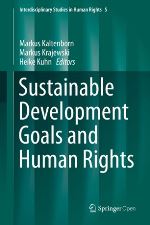The Role of Public and Private Actors in implementing the SDGs
Published on Mon, 2020-02-10 08:31
In the 2030 Agenda governments committed to a revitalized Global Partnership between States and declared that public finance has to play a vital role in achieving the Sustainable Development Goals (SDGs). But in recent decades, the combination of neoliberal ideology, corporate lobbying, business-friendly fiscal policies, tax avoidance and tax evasion has led to a massive weakening of the public sector and its ability to provide essential goods and services and to fulfill its human rights obligations. Public-private partnerships (PPPs) are promoted as the most efficient way to provide the necessary means for implementing the SDGs, but many studies have shown that privatization and PPPs involve disproportionate risks and costs for the public sector and can even exacerbate inequalities, decrease equitable access to essential services and jeopardize the fulfilment of human rights. An analysis by Jens Martens, from Global Policy Forum. Reclaiming the Public Policy Space for Sustainable Development and Human Rights In the 2030 Agenda governments committed to a revitalized Global Partnership between States and declared that public finance has to play a vital role in achieving the Sustainable Development Goals (SDGs). But in recent decades, the combination of neoliberal ideology, corporate lobbying, business-friendly fiscal policies, tax avoidance and tax evasion has led to a massive weakening of the public sector and its ability to provide essential goods and services and to fulfill its human rights obligations. The same corporate strategies and fiscal and regulatory policies that led to this weakening have enabled an unprecedented accumulation of individual wealth and increasing market concentration. The proponents of privatization and public-private partnerships (PPPs) use these trends to present the private sector as the most efficient way to provide the necessary means for implementing the SDGs. But many studies and experiences by affected communities have shown that privatization and PPPs involve disproportionate risks and costs for the public sector and can even exacerbate inequalities, decrease equitable access to essential services and jeopardize the fulfilment of human rights. Therefore, it is high time to counter these trends, reclaim public policy space and take bold measures to strengthen public finance, rethink PPPs and weaken the grip of corporate power on people’s lives. Article by Jens Martens. This article is based on the findings of the international civil society report Spotlight on Sustainable Development 2017. An earlier version was published as introductory chapter of this report on behalf of the Civil Society Reflection Group on the 2030 Agenda for Sustainable Development. Read the article here. Source: Sustainable Development Goals and Human Rights, Editors Markus Kaltenborn, Markus Krajewski, Heike Kuhn. |
SUSCRIBE TO OUR NEWSLETTER



